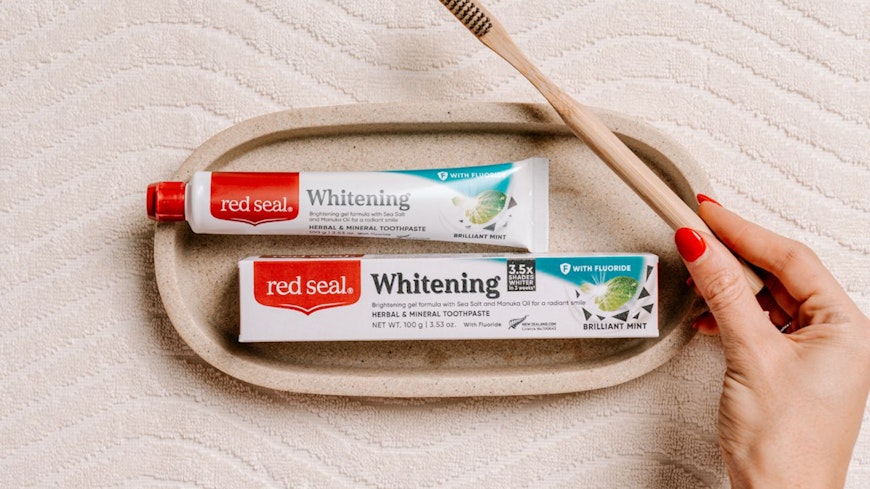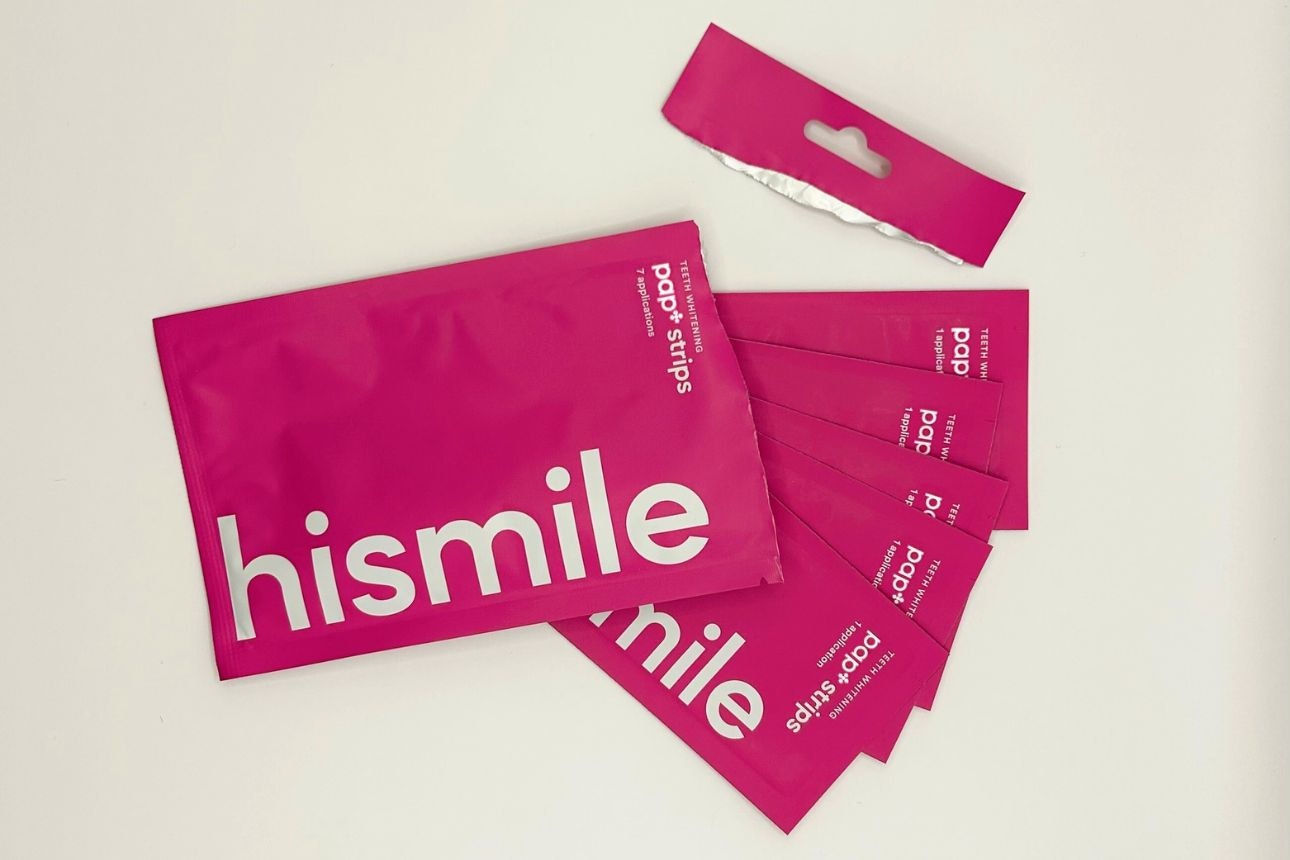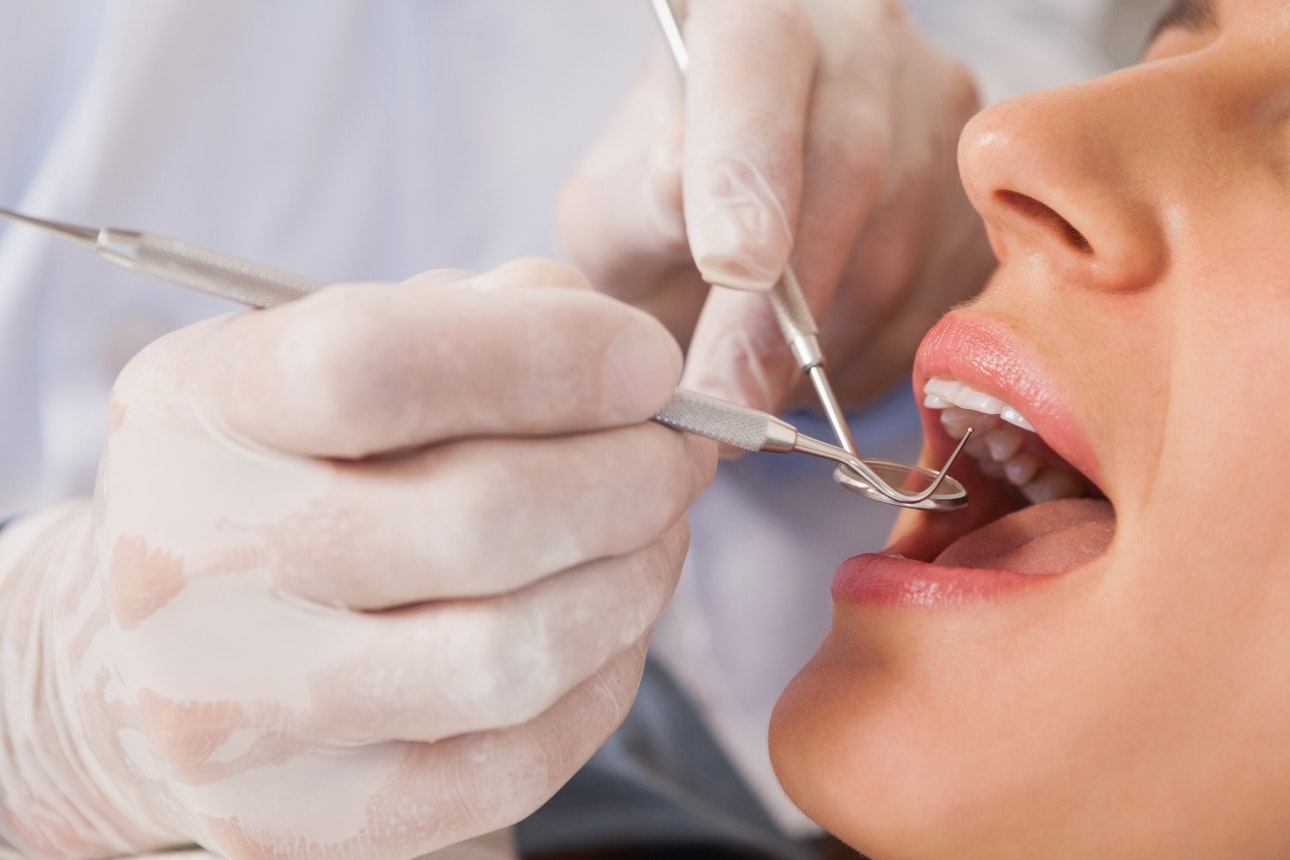
By Vanessa Pratley
Investigative Journalist | Kaipūrongo Whakatewhatewha
Red Seal says its Whitening Brilliant Mint Toothpaste can visibly enhance the whiteness of teeth in just 3 weeks. But the company’s marketing could be brushing up against the law.
In a recent Facebook advertisement, Red Seal compared its toothpaste with a hypothetical alternative whitening toothpaste.

The advertisement lists the ingredients used in each paste, with the alternative toothpaste containing tetrasodium pyrophosphate, cocamidopropyl betaine, sodium hexametaphosphate and trisodium phosphate.
It states consumers should swap the alternative toothpaste for the Red Seal toothpaste, which is advertised as containing ingredients like eucalyptus leaf oil, sea salt and manuka oil.
Cherry-picked ingredients
We think the ad gives the impression that Red Seal’s toothpaste is better because it has recognisable ingredients.
However, a closer look at Red Seal’s Whitening Brilliant Mint Toothpaste shows that it contains ingredients such as sodium monofluorophosphate and sodium cocoyl glutamate. These may come from natural sources, like coconut oil, but choosing to exclude their chemical names from the ad, while highlighting the chemical names in the hypothetical toothpaste, seems like an unfair comparison.
We think the advertisement could be misleading because it cherry-picks ingredients, using consumers’ lack of specialised knowledge to induce fear and drive buying behaviour. Misleading conduct, including advertising, is banned under the Fair Trading Act. If found in breach of the act, a business could be liable to a fine not exceeding $600,000.
Fear-based marketing
We are concerned about Red Seal’s ad and think it’s unfair for the company to use fear-based marketing. We asked Red Seal what it thought about our assessment, but it refused to answer our questions about the ad.
Rob Aitken, marketing professor at Ōtākou Whakaihu Waka University of Otago, said the jury was out on whether fear was an effective marketing tool.
Recalling Aotearoa’s famous speeding and drink driving advertisements, Aitken said, “there is some research which suggests they are effective at attracting attention – but not keeping it or changing behaviour. Overall, they have been shown to have only short-term effects and not helpful to change longer term behaviours.”
Not only was fear-based marketing unfair on consumers, but the Red Seal ad could be “anxiety inducing” for some. This was typical of health-related ads, Aitken said.
Can you whiten your teeth with salt and oil?
The toothpaste claims it can whiten teeth up to 3.5 shades in 3 weeks with regular brushing.
We think the advertisement could imply that ingredients like sea salt and manuka oil are responsible for the whitening claims. But Dr Mo Amso, chief executive of the New Zealand Dental Association, says it’s unlikely those ingredients would have any whitening effect.
“I am not aware of their use in whitening. Salt and baking soda are abrasive and sometimes used in dental products to remove basic staining. They are not whitening products.”
We asked Red Seal to specify the whitening ingredient in its toothpaste. Red Seal said it used an abrasive silica designed to remove stains when brushing. But it wouldn’t expand on which listed ingredient it was.
Dr Amso said, “Effective tooth whitening is predominately carried out by peroxide-containing products. These vary in concentration which alters the speed and effectiveness of their action.”
Red Seal said its products “have been tested and we are comfortable that all claims are substantiated”. However, it declined to share the studies with us.
“Our studies are confidential and commercially sensitive information, which unfortunately we cannot share.”

Red Seal Whitening fluoride Brilliant Mint Toothpaste / Source: Red Seal website
Should you worry about what’s in your toothpaste?
The Environmental Protection Authority (EPA) regulates activities that affect Aotearoa’s environment. This involves setting standards for the ingredients used in products like cosmetics, which includes toothpastes.
Often, people perceive terms like "natural” or “organic” to mean good, safe or better. However, familiar ingredients that may be labelled as natural can still be harmful to people and the environment. EPA says on its website: “Even ingredients that are organic or natural can be harmful.”
For the most part, consumers shouldn’t worry about harmful chemicals in their toothpastes. EPA’s website says: “Most cosmetics and toiletries you buy in New Zealand are safe to use because of our strict rules and high safety standards.”
“New Zealand cosmetics manufacturers and importers must comply with the group standard for cosmetics products. The group standard sets high standards. It limits the ingredients that can be used and requires any safety measures or potential risks to be clearly displayed on the product.”
None of the chemicals listed in the hypothetical toothpaste in Red Seal’s ad are flagged by EPA as hazardous.
Mica
Red Seal also declined to comment on using mica in its whitening toothpaste. Mica is a sparkly mineral found in deposits all over the world. In some areas, including parts of India, exploitative and illegal child labour is used in the mining and manufacturing of the pigment. We asked Red Seal where it sourced its mica from, but it wouldn’t answer.
We say
Consumers deserve all the information necessary to make an informed choice. We think Red Seal’s ad could be misleading by unfairly cherry-picking information and relying on consumers’ anxiety when it comes to unknown ingredients.
We also think it could give consumers the false impression that salt and manuka oil can whiten teeth.
Because toothpastes for sale in New Zealand are generally safe, we don’t have to worry too much about which toothpaste to use.
For adults, the Ministry of Health recommends brushing twice daily for 2 minutes with a fluoride toothpaste (containing at least 1000ppm fluoride) to help prevent tooth decay.
For children under 6, a smear of fluoride toothpaste is sufficient. From 6 years, a pea-sized amount should be used.



